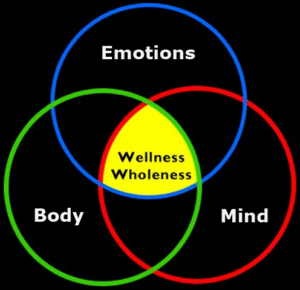A healthy immune system is essential for a healthy life. It defends against viral and bacterial incursions and equips us to resist future infectious or toxic exposures. A healthy body has adequate reserves of antibodies and sensitized white blood cells. Hopefully, these resources are not called upon too often.
 In The Healing Self: A Revolutionary New Plan to Supercharge Your Immunity and Stay Well for Life, Drs. Deepak Chopra and Rudolph Tanzi provide eight strategies for maintaining a healthy immune system. They also call for an expanded definition of immunity that draws attention to the body-mind-emotion connection. They’re not alone.
In The Healing Self: A Revolutionary New Plan to Supercharge Your Immunity and Stay Well for Life, Drs. Deepak Chopra and Rudolph Tanzi provide eight strategies for maintaining a healthy immune system. They also call for an expanded definition of immunity that draws attention to the body-mind-emotion connection. They’re not alone.
The field of psychoneuroimmunology (PNI) studies how our mental and emotional states impact the immune system. For example, research demonstrates that protracted stress suppresses the immune response. Likewise, chronic conditions are worsened by stress, depression, and anxiety, and may be improved by positive feelings. As a case in point, physician, social activist, and comedian “Patch” Adams demonstrated that laughter promotes healing in clinical settings.
Not surprisingly, the strategies in Dr. Chopra and Tanzi’s book focus on establishing a healthy body, healthy mind, and healthy emotional life. It places responsibility squarely on the shoulders of the individual. You can’t pick and choose which strategies you apply if you want the best results. You can’t rely on medical doctors or prescription drugs to the work. Self-care demands conscious choice, day-in and day-out.
ONE: Get adequate rest. Adopt healthy sleep habits to ensure 7-8 hours of restorative sleep every night. Take time every day to be alone and quiet. Breathe deeply!
TWO: Pursue an anti-inflammation diet: Consider the Mediterranean Diet for its emphasis on whole organic produce (fruits and vegetables), legumes, whole grains, and cold water fish (e.g., salmon). Get plenty of fiber and eliminate excess sugar, salt, and fat. Get rid of stale foods.
THREE: Manage stress. Approach everyday challenges with a state of alertness while remaining centered. Be mindful of what you can fix, what you can tolerate, and what you should leave. Learn to bend. Take time to meditate or do yoga. Seek positive outlets. Spend time in nature. Cultivate a support network. (NOTE: The number and diversity of interpersonal networks promote a strong immune system!)
FOUR: Stimulate your mind. There’s no expiration date on our ability to generate new neurons and forge new neural networks. Knowledge builds synapses and adds to our memory warehouse. The bigger our mental reserves, the more time we’ll have in advanced age before naturally occurring losses become debilitating. So, take up challenging mental activities. Explore new interests. Solve interesting problems.
FIVE: Move. A sedentary lifestyle is a risk factor for disease and premature aging. Get ~150 minutes of moderate to intense aerobic training weekly with 2 or more weight training sessions. If working at a desk job, stand up and move around every hour. Use stairs. Spend time with physically active friends.
SIX: Establish health-promoting core beliefs. Beliefs turn into thoughts, words, and actions. Forwarding beliefs have the following characteristics: optimistic, flexible, tolerant, open to change, loving, kind, happiness-promoting, self-assuring, relationship-building. Use these beliefs to create a vision of your best life.
SEVEN: Minimize struggle. Adopt an allowing attitude. Approach situations without attachment or resistance. Seek harmony by setting the example, not controlling others. Act gracefully. Share responsibility. Accept life as a smooth, self-directed stream of events.
EIGHT: Evolve. Enjoy being a work-in-progress and set a goal to grow every day. Change your daily narrative for the better. Look for opportunities to be compassionate, generous, loving, and grateful. Catch negativity early. Get sticky emotions to move by walking, going outside, breathing, sighing. Resist the voice of fear. Develop a supportive inner dialog. Keep company with positive, optimistic, inspirational people.